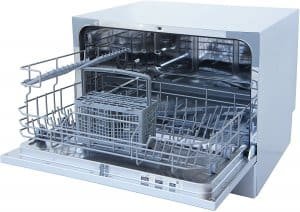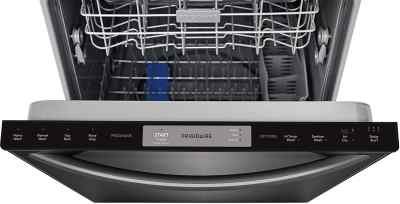Dishwasher salt is a sodium chloride having no iodine which is added and sold for the use of helping of softening the water in the dishwashers. It has larger grains compared to table salt.
This kind of salt contains the resin in the small yellow balls. It’s for the purpose of removing the calcium and the magnesium of ions from the purpose of removing the calcium and the magnesium of ions from the incoming water which is the hard one.
The resin contains the negative charge of atomic, so it attracts the sodium ions to the surface. The calcium as well as the magnesium ions contains more of the highly charged resulting for them to elbow it a way to the resin, then displacing sodium ions in the resin having the 2 is to 1 ratio: in which for every calcium or the magnesium ion which gets the trapped-on resin, 2 of the sodium ions will be released.

Through trapping these two, the water can be softened. This process is named as “ion change”. The processes can only work, as long sodium ions are present in the resin. after several times of using it, the resin will become saturated together with the calcium and the magnesium ions; there are not enough of the sodium ions remain to do in the job in the removing more of it from water.
The strong brine of solution allowed to be flown over with the resin, so it will be displacing calcium as well as the magnesium, which is built up in there, and then resetting its surface with the sodium ions. This process is called as “regeneration.” The dishwasher machines mostly do the job automatically, it can be either certain amount of the water that flowed or every use with the machine.
Dishwasher salt is mostly used in countries who have hard water like in Europe as well as in UK. 60% homes in UK do have the hard water; mostly in the south as well as in East of the England. This kind of process is not any more needed in the Scotland area because the water there is very soft.
When you are going to fill the container with dishwasher salt, it can be full with water. Put the salt and it will just sink to container’s bottom then displace water. Besides, as soon as salt is used, a brine solution is made, so you do not have to worry in the drying of it. Most of the machines have a funnel, which you stick in the hole of the cup’s salt so it will make you easier of filling it.
Finally, if you are living in the area having the hard water one, use the dishwasher salt in washing your kitchen utensils. It will result to very clean utensils. Of course you don’t want to use utensils still having stains. Even if your food is delicious, you will not have the appetite of eating it. So, use dishwasher salt in washing.
4.4 LB Dishwasher Salt/Water Softener Salt – Compatible with Bosch, Miele, Whirlpool, Thermador and More (2 KG)
- ABSOLUTELY PURE: When it comes to dishwasher salt, you want a very coarse grain with no additives. Our dishwasher salt is 100% pure, very coarse grain salt – just what your dishwasher needs!
- HIGHLY EFFECTIVE: Cuts right through hard water residue / limescale in your dishwasher, softening your water and leaving your dishwasher and your dishes residue-free, watermark-free and spot-free. A cleaner wash, every time!
- UNIVERSALLY COMPATIBLE: If your dishwasher needs salt, ours is a perfect match. Compatible with all Miele, Bosch & Whirlpool models requiring salt, including 800 Plus and ADA (SGE). Note: Only use with dishwashers with water softener containers
- FREE OF ADDITIVES: Our salt is food-grade, non-GMO and vegan. No caking compounds, iodine or any other additives!
- EASY TO USE: Simply add salt to the dishwasher’s salt unit and close. Check the level and refill as necessary. Consult your dishwasher manual for exact, model-specific directions


1 thought on “Dishwasher Salt”